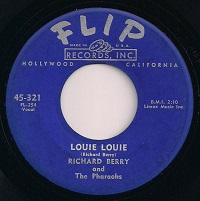
"Louie Louie" is a rhythm and blues song written and composed by American musician Richard Berry in 1955, recorded in 1956, and released in 1957. It is best known for the 1963 hit version by the Kingsmen and has become a standard in pop and rock. The song is based on the tune "El Loco Cha Cha" popularized by bandleader René Touzet and is an example of Afro-Cuban influence on American popular music.
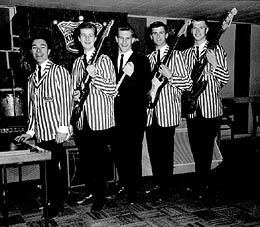
The Kingsmen are a 1960s American rock band from Portland, Oregon. They are best known for their 1963 recording of R&B singer Richard Berry's "Louie Louie", which held the No. 2 spot on the Billboard charts for six weeks and has become an enduring classic.

Nuggets: Original Artyfacts from the First Psychedelic Era is a compilation album of American psychedelic and garage rock singles that were released during the mid-to-late 1960s. It was created by Lenny Kaye, who was a writer and clerk at the Village Oldies record shop in New York. He would later become the lead guitarist for the Patti Smith Group. Kaye produced Nuggets under the supervision of Elektra Records founder Jac Holzman. Kaye conceived the project as a series of roughly eight LP installments focusing on different US regions, but Elektra convinced him that one double album would be more commercially viable. It was released on LP by Elektra in 1972 with liner notes by Kaye that contained one of the first uses of the term "punk rock". It was reissued with a new cover design by Sire Records in 1976. In the 1980s, Rhino Records issued Nuggets in a series of fifteen installments, and in 1998 as a 4-cd box set.

The Sonics are an American garage rock band from Tacoma, Washington, that formed in 1960. Their aggressive, hard-edged sound has been a major influence on punk and garage music worldwide, and they have been named inspirations to the White Stripes, LCD Soundsystem, Nirvana, The Hives, and other musical artists.
Wand Records was an American independent record label, started by Florence Greenberg in 1961 as a subsidiary of Scepter Records. Artists on Wand Records included The Isley Brothers, The Kingsmen, Mel Wynn & the Rhythm Aces, Chuck Jackson, and the Monzas.
The Wailers, often known as The Fabulous Wailers, were an American rock band from Tacoma, Washington. They became popular in the Pacific Northwest from the late 1950s to the early 1960s, performing saxophone-driven R&B and Chuck Berry rock and roll. Their biggest hit was "Tall Cool One", first released in 1959, and they have been credited as being "one of the very first, if not the first, of the American garage bands."
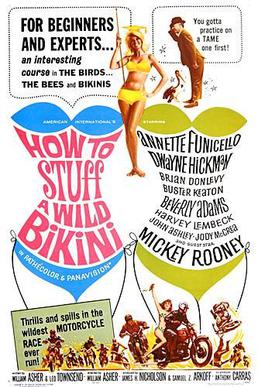
How to Stuff a Wild Bikini is a 1965 Pathécolor beach party film from American International Pictures. The sixth entry in a seven-film series, the movie was directed by William Asher and features Mickey Rooney, Annette Funicello, Dwayne Hickman, Brian Donlevy, and Beverly Adams. It was written by Asher and Leo Townsend. The film features a brief appearance by Frankie Avalon and includes Buster Keaton in one of his last roles.

A Jolly Christmas from Frank Sinatra is a Christmas album by American singer Frank Sinatra, originally released by Capitol Records in 1957.

Get Into Something is the eighth album by the Isley Brothers, released on their T-Neck imprint in 1970. Although the album itself did not chart, it includes six songs that appeared in the top 30 of the Billboard R&B chart between late 1969 and early 1971 : the title track, "Bless Your Heart", the horn and drum-driven "Keep on Doin'", "Freedom", "Girls Will Be Girls" and "If He Can You Can".

The Heat Is On is the thirteenth studio album by American soul and funk group The Isley Brothers, released June 7, 1975, on T-Neck Records and Epic Records. Written and produced entirely by the group, the album was recorded in 1975 at Kendum Recorders in Burbank, California. The Heat Is On features musical elements of rock, and is divided between uptempo funk songs and soul ballads.

Quadrophenia is the soundtrack album of the 1979 film Quadrophenia, which refers to the 1973 rock opera Quadrophenia. It was initially released on Polydor Records in 1979 as a cassette and LP and was re-released as a compact disc in 1993 and 2001. The album was dedicated to Peter Meaden, a prominent Mod and first manager of The Who, who had died a year prior to the album's release.
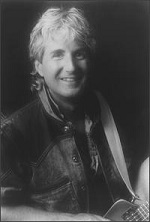
Jack Brown Ely was an American guitarist and singer, best known for singing the Kingsmen's version of "Louie Louie". Classically trained in piano, he began playing guitar after seeing Elvis Presley on television. In 1959, he co-founded the Kingsmen and with them recorded "Louie Louie" in 1963; Ely's famously incoherent vocals were partly the result of his braces and the rudimentary recording method. Before the record became a hit Ely was forced out of the group and began playing with his new band, the Courtmen. Ely died in Terrebonne, Oregon, on April 28, 2015, at age 71.

The Kingsmen in Person is the first album by the rock band The Kingsmen, released in 1963. The album featured "Louie Louie", the band's biggest success.

The Kingsmen Volume II is the second album by the rock band The Kingsmen, released in 1964.
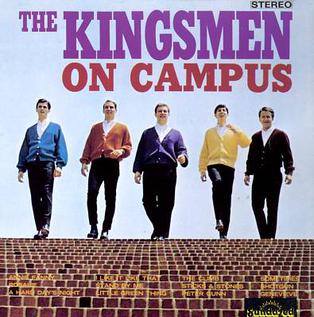
The Kingsmen on Campus is the fourth album by the rock band The Kingsmen, released in 1965.

15 Great Hits is the fifth album by the rock band The Kingsmen, released in 1966.

Up and Away is the sixth album by the rock band The Kingsmen, released in 1966.

The Kingsmen Greatest Hits is the seventh album by American rock band The Kingsmen, released in 1966.
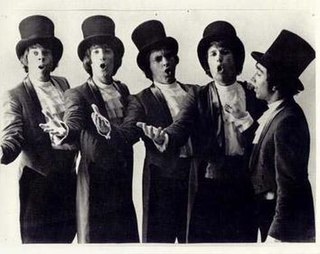
Don and the Goodtimes were an American garage rock band, formed in Portland, Oregon, United States, in 1964. Fronted by Don Gallucci, former keyboardist of the Kingsmen, the group made a name for itself in the Northwest rock scene performing in a similar style as their contemporaries the Wailers and the Sonics. Over time, Don and the Goodtimes honed their vocal harmonies and earned two hits on the Billboard Hot 100 in 1967, including their biggest hit "I Could Be So Good to You". The band released their album, So Good, and later experimented with psychedelia under the moniker Touch before disbanding in 1969.
"The Jolly Green Giant" is a song written by Lynn Easton, Don Harris, and Dewey Terry and performed by The Kingsmen. It reached No.1 on the Canadian chart, No.4 on the U.S. pop chart, and No.25 on the U.S. R&B chart in 1965. It was featured on their 1965 album The Kingsmen Volume 3. The song was based on the Green Giant food brand's mascot the Jolly Green Giant. The single originally only credited Easton as the writer, but Harris and Terry were later added when it was determined the song was a re-write of The Olympics song "Big Boy Pete".

















